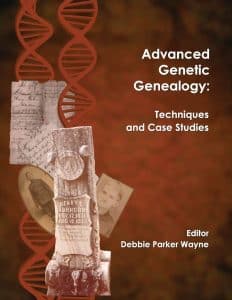NOTE: THIS WEBSITE IS A WORK IN PROGRESS. RESOURCES AND DATA ARE ADDED DAILY.
IMPORTANT: We are in urgent need of funding to keep this project alive and ensure its future. If you’re enjoying the site and see our vision for the project, please consider contributing to the Melungeon Roots crowdfunding campaign today. It is only with your help that we can continue this work. MORE INFO / DONATE
Thanks so much for your support! – Jes
![]()
Advanced Genetic Genealogy: Techniques and Case Studies
share:
Some buttons on this page link to external websites. If you visit one of our affiliate sites and make a purchase, I may receive a small commission at no extra cost to you. More info
- UPDATED: 6.29.2025
- genetic genealogy, genealogy
author:
Debbie Parker Wayne
editor:
n/a
publisher:
date:
3.20.2019
ISBN:
9781733694902
pages:
414
notes:
contents:
description:
Eight chapters study real families (some using anonymized identities), including methods, tools, and techniques. Jim Bartlett covers how to triangulate a genome (mapping DNA segments to ancestors). Blaine T. Bettinger demonstrates the methodology for visual phasing (mapping DNA segments to the grandparents who passed down the segment to descendants, even when the grandparents cannot be tested). Kathryn J. Johnston shows how to use X-DNA to identify and confirm ancestral lines. James M. Owston describes findings of the Owston Y-DNA project. Melissa A. Johnson covers adoption and misattributed parentage research. Kimberly T. Powell provides guidance when researching families with endogamy and pedigree collapse. Debbie Parker Wayne combines atDNA and Y-DNA in a Parker family study. Ann Turner describes the raw DNA data and lab processes.
Three middle chapters cover genealogy standards as they relate to DNA and documentary evidence. Karen Stanbary applies the Genealogical Proof Standard to genetic genealogy in a hypothetical unknown parentage case illustrating start-to-finish analysis. Patricia Lee Hobbs uses atDNA to identify an unknown ancestor and that ancestor's maiden name, moving back and forth between documentary and DNA evidence. Thomas W. Jones describes best practices for genealogical writing and publishing when incorporating DNA evidence.
Three concluding chapters deal with ethics, emotions, and the future. Judy G. Russell covers ethical considerations. Michael D. Lacopo describes the effect on relationships when family secrets are uncovered, surfacing issues for all concerned. Debbie Kennett covers the current limitations and future promise of using DNA for genealogy. An extensive glossary, list of recommended resources, and index are included.
CMOS:
author-date:
Other Resources
- The Last Conquistadors of Southeast North America: Pedro Menéndez and the Collapse of La Florida’s Frontier
- Beyond Hill and Hollow: Original Readings in Appalachian Women’s Studies
- Her Words: Diverse Voices in Contemporary Appalachian Women’s Poetry
- The Birth of Black America: The First African Americans and the Pursuit of Freedom at Jamestown
- Jambalaya: The Natural Woman’s Book of Personal Charms and Practical Rituals
- Catawba Nation: Treasures in History

